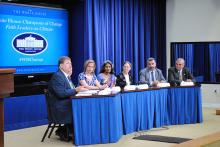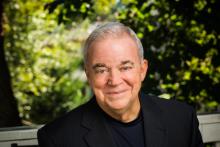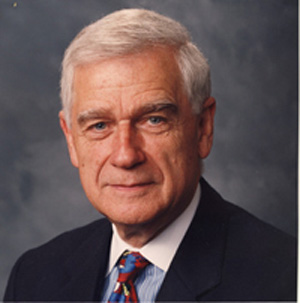Young Evangelicals

From a zero-waste synagogue to global development work after natural disasters, environmental projects by faith leaders are being hailed by the Obama administration as examples of exemplary leadership on climate change.
Environmental Protection Agency Administrator Gina McCarthy highlighted initiatives by a dozen leaders from a range of faiths, who were recognized July 20 in Washington, D.C., as “Champions of Change” for their environmental initiatives.
“As faith leaders, no voice is really more important than yours in this,” said McCarthy.

Yesterday morning, an op-ed piece went live on CNN by a young evangelical author named Daniel Darling, titled " Millennials and the false ‘gospel of nice.’ Darling’s piece is clearly written in response to many recent articles — like Rachel Held Evans’ recent piece "How evangelicals won a culture war and lost a generation " — which argue that many of the leaders of evangelical Christianity have abandoned the core convictions and teachings of Jesus Christ and instead have leveraged their faith as a weapon to be used against anyone who disagrees with their political and moral principles that they claim are rooted in Scripture.
All of this is very fresh in our minds as news broke yesterday that Christian relief organization World Vision lost more than 10,000 child sponsorships from people who disagreed with the organization’s policy change on hiring people in legal same-sex marriages. To many who watched this controversy unfold, this is an utter travesty. It seems simply unfathomable that anyone who claims to follow Christ could justify removing support from the impoverished children that they know by name because they disagreed with the organization’s hiring policy.
In his op-ed piece, Darling argues that the cry of many progressive and millennial evangelicals is:
"If only orthodox evangelical leaders would give up their antiquated beliefs, get more in step with the real Jesus, the church and the world would be better off."
He then continues by saying that:
"embedded in this narrative are two presuppositions: Young evangelicals are fleeing the church at a rapid pace [and] the real message of Jesus looks nothing like orthodox Christianity."
When I read these comments in Darling’s piece, I was utterly fascinated. Because as a millennial evangelical, and one who is participating in these conversations on a national and international level, I have never heard a single person call for "evangelical leaders to give up their antiquated beliefs." I have never heard anyone say "the real message of Jesus looks nothing like orthodox Christianity." When I read Darling’s piece, it became crystal clear to me what the key problem is that is causing so much friction between the "old guard" in evangelicalism and us millennials:
The old guard has confused orthodoxy with their political and moral interpretations of Scripture.


1) Jesus Avoided Labels
In fact, a large part of his ministry was breaking down preconceived titles, trying to bring about a world where there would be no differentiation between Jew or Gentile. He promoted the idea that loving God trumped racial, ethnic, social, religious, and political identities.
This doesn’t mean we’re simply “all the same underneath.” Jesus recognized that people had distinct differences, on both a personal and communal level. He embraced unique cultures and traditions and utilized them to reveal his glory, recognizing and valuin

Many Christians have a confidence problem. They love Christ but are ashamed of everything associated with him. They want to be known as a Christian — just not that type of Christian. You know the type: the Westboro Baptists of the world; the scumbag televangelists on late-night cable; the fear-mongering preachers spewing apocalyptic prophecies; the proselytizers that scream at people outside of baseball stadiums; the celebrities claiming stupid things in the name of God; the “friends” who post bigoted messages on Facebook; the politicians who manipulate faith communities to serve their agendas; the anti-science, anti-environment, anti-women, anti-homosexuality, and anti-everything Christians who basically spread negativity wherever they go — the people who drag Christ’s name through the mud.
Today’s believers are hypersensitive and self-aware about the current events happening within media and culture, and in a society obsessed with consumerism, corporate loyalty, branding, product placement, and publicity, they understand that the Christian reputation is experiencing a fast decline, and they feel guilty by association.
This decline is not just happening in the “secular world,” but also within faith communities. Infighting, criticism, and self-deprecation are rampant within the American Church, and much of this is deserved, but it also reflects a corporate Christian identity that feels embarrassed and humiliated.
The Huffington Post reports:
In the holiday season, many of us reflect on what it is for which we are thankful. Naturally, we give thanks when things are going well, and even in a disaster we might be grateful that the catastrophe was not worse or that people stepped forward to render assistance. Claudius's poem presupposes a general climatic stability that for several centuries has been conducive to thankful worship.
But how does this optimistic hymn play in the era of radical climate change? How will it sound in the future, when each decade may bring yet more frequent and extreme climate events? What is the providential reading of "God's almighty hand" in a prolonged and life-threatening drought, or in the agrarian disaster of a dust bowl? When we are battered by a Hurricane Sandy or Katrina, how do we understand the majestic line about God in the Navy hymn, "Who bidd'st the mighty ocean deep its own appointed limits keep?"
Read more here.

The Pew Forum recently released a new study, “Nones on the Rise.” This was not about my friends called the “Nuns On The Bus,” who just did a tour around the country focusing on social justice. Rather, It details the concerning trend of those in our country who have given up on religion altogether.
Social scientists tell us that adults, especially young adults, are increasingly disconnected from our established religious traditions. “Nones,” the Pew forum calls them, have grown from 15 percent of U.S. adults to 20 percent in only five years. One-in-three adults under 30 check the religious affiliation box, “None of the above” or “Unaffiliated.” Despite the fact that 68 percent of nones believe in God, only 5 percent of them attend church once or more a week, and 22 percent attend monthly/yearly. (Learn more about this group in our blog series Meet the Nones.)
But the focus on the next generation is not all bad news. On Tuesday, I had the pleasure of moderating a diverse panel of seven young evangelicals. Each had unique experiences and backgrounds. Some self-identified as liberal, while others self-identified as conservative. But those political ideologies could not separate their core evangelical principles.
What culture war? At a survey release of young evangelicals and proceeding panel discussion, common ground was the pervading theme.
While panelists ranged in religious and political backgrounds — representing groups like Young Evangelicals for Climate Action, World Relief, Family Research Council, USAID, World Vision, the Manhattan Declaration, and Feed the Children — there was an overarching agreement that while young evangelicals are largely pro-life, life issues now extend to beyond the typical to things like creation care and immigration.
“There is still a lot of tension that many young people feel in trying to identify with one political party or the other,” Adam Taylor, vice president of advocacy for World Vision. “… There is a real deep commitment to a pro-life agenda, but that agenda has now expanded and includes a core and strong commitment to addressing issues of poverty.”

In my last column, "Three Numbers that Predict the Future of the Planet", I wrote about the state of the climate crisis and focused on three key data points that reveal a bleak, though not altogether hopeless, reality for us and for the rest of the planet.
As promised, this column is forward-looking and moves from describing the problem to prescribing the solution. To this end, I continue to draw heavily from the wisdom of Bill McKibben, Jim Ball, and other climate prophets who understand the times and are faithfully fighting to get us on the right track.
The way forward is not easy, but it will be good in the long run. Essentially, we need to set and enforce a limit on all remaining global warming pollution on the national and international scale, which will, we hope, keep warming to within 2oC. This will include some sort of pricing mechanism so that polluters have to take responsibility for paying for the costs of their own pollution. The problem is that we have not yet been able to muster the socio-political momentum necessary to reach these binding agreements. Turns out the polluters (largely the fossil fuel industry) don’t want to have to clean up after themselves. They’re also willing to fight with billions of dollars in campaign contributions and lobbying money to keep the status quo.

Good news: Evangelical Christians are stepping back up to overcome the climate crisis.
After months of careful preparation, a new national advocacy initiative called Young Evangelicals for Climate Action (Y.E.C.A.) has just gone live.
In seeking to live as Christ’s disciples, Y.E.C.A. has come to see the climate crisis not only as a pressing challenge to justice and freedom, but also as a profound threat to “the least of these” with whom Jesus identifies in Matthew 25. The early effects of climate change are already impacting many of our neighbors, both in the U.S. and around the world, and our time to act is running short.

The Church is not a purity cult. We try to turn our institutions into purity cultus of behavior or belief all the time. We're really good at it. We've fought wars over our theologies wrapped in nationalism. We've crusaded from west to east all in the name of the purity of the Church. "Ex filio" was a war cry a thousand years ago.
Rachel Held Evans is right. Evangelicalism may very well be losing a generation and by extension, we all are. But then some of us have been losing parts of generations for a long time. Some of the Boomers walked never to return. More of Gen X did the same. Now the enormous generation of Millennials is having its say. Many are voting with their feet. They are tired of the culture wars. They are tired of the purity fights. Many people from various generations are. They are all voting with their feet. The same thing is happening in Catholicism though some are choosing to stay. If it weren't for the influx of Catholic immigrants to the US, we'd see the same statistical free fall in Catholicism that the mainline is experiencing.

On Thursday, Sojourners launched its 2012 election campaign, Voting For Us, and the Public Religion Research Institute and Berkley Center released its “2012 Millennial Values Survey.” Young Christians, and particularly young evangelicals are a significant demographic to understand. They could be a large “persuadable” population in the run up to the November elections.
What do they believe? What are their priorities? How will they vote?
Young evangelicals are different from their parents and any generation that has preceded them. Their priorities are changing, their world view is shifting and their political engagement is becoming increasingly nuanced – going well beyond the narrow interests of the Religious Right that until now have been associated with evangelicalism in the United States.

One in four young millennials (age 18-24) identify themselves as religiously unaffiliated—up from 11 percent in their childhood. But the distinguishing factor for this age group is that the “unaffiliated” label may stick with them into adulthood and beyond.
“This cohort is so dramatically different—racially, ethnically and religiously—it can’t help but change the character of our country,” Daniel Cox, director of research at Public Religion Research Institute, said at the presentation of the “Millennial Values Survey,” conducted by PRRI and Georgetown University’s Berkley Center for Religion, Peace and World Affairs.
In the past, young adults have tended to lapse in faith during their college years and twenties, only to return with age and family. Robert Jones, PRRI founder and CEO, said that’s not likely to happen as much with this age group.
“We’ve got to come up with some new measures of religion,” Jones said.
College-aged adults are not letting their moral beliefs on social issues filter into their politics.
According to the just released “Millennial Values Survey” by the Public Religion Research Institute and Berkley Center for Religion, Peace and World Affairs at Georgetown University, adults age 18-24 are much less likely than their parents to cite social issues like abortion (22 percent) or same-sex marriage (22 percent) as critical.
While the group is split on social issues personally, it doesn’t factor into its political reality. For example, while 51 percent believe abortion is morally wrong, 59 percent believe access to abortion should be legal. Likewise, 48 percent believe sex between members of the same gender is morally wrong, but 59 percent favor allowing same-sex couples to legally marry.
The gap is also evident in their religious affiliation. The percent of religiously unaffiliated jumped from 11 percent in childhood to 25 percent now.
Their attitudes toward Christianity paint a picture of possible motives behind the shift. Two-thirds say that Christianity can be described as “anti-gay,” and 62 percent believe present-day Christianity is “judgmental.”
The full survey will be released this morning at Georgetown University. Check back with Sojourners for more coverage of the findings.
Sandi Villarreal is Associate Web Editor for Sojourners. Follow Sandi on Twitter @Sandi.

Perhaps you have read Rachel Held Evans' post titled, "15 Reasons I Left Church." With over 800 comments, it has clearly struck a chord with some people. Similarly, Christian Piatt's post on God's Politics, Four Reasons Why I Came Back To Church, has been making the rounds on Facebook. Well, I posted it, at least. They are both about the authors' experiences of being a young adult in relationship with institutional Christianity. It's a difficult topic to write about ... there are trends, of course, but in general the journey is so particular that one cannot really generalize. I think both authors do a good job simply offering up their testimonies, affording the readers an opportunity to make whatever connections we find.
So, in the spirit of connecting the dots, I offer this song and a wee bit of testimony.

There has been a lot of talk lately — both in the public sphere and most definitely here at the Sojo offices—about young people leaving the church.
I would argue that--while some of my fellow millenials are jumping ship on Christiainity--many are not so much leaving the big-C “Church,” (see my post on the definition of the word), as they are leaving established churches. The surveys show a migration from a particular denomination to “no religion.” To me, that doesn’t say atheist/agnostic; it just says that this generation of Christians doesn’t want to be labeled.
If you look at the numbers, millenials are quitting the church, not quitting Jesus. Unaffiliated does not necessarily mean unChristian.
My generation doesn’t want the “Southern Baptist,” “Wisconsin Evangelical Lutheran Synod,” “Roman Catholic” affiliations thrust upon us. Not only do we disagree with some of the tenants of said denominations, but each title carries all sorts of baggage left at our feet.
We’ve seen post after post listing possible catalysts to twenty-somethings turning away from the religion of our fathers in droves. Presidential hopeful Rick Santorum blames college. The reasons listed here on God’s Politics, in books and by church leaders themselves each probably factor in to some degree.
But I do want to dismiss some of them.

There has been a surprisingly positive response to the article I published yesterday called “Seven Reasons Why Young Adults Quit Church.” And as I noted, it was hardly a comprehensive list. There were several others I thought were worth noting if I’d had the room, so I thought I’d continue with the same theme today.
And as I said in yesterday’s article:
- Although the answer(s) vary from person to person, there are some general trends that I think apply in most cases, and;
- In the list below, when I refer to “we,” “I” or “me,” I’m referring to younger adults in general, and not necessarily myself.

In his column last week, Sojourners chief Jim Wallis talked about his frustration with the perennial misuse of the word "evangelical" by various media to describe folks and ideas that, in his view, and that of many of us who self-describe as evangelicals, don't bear any resemblance to what we understand that term to actually mean.
Below is a compilation of recent media reports where the word "evangelical" is invoked. When you read these, evangelical brothers and sisters, do you recognize yourself in how the word is used and defined? Or does it ring false to you and your understanding of what "evangelical" really and truly means?
 Mark O. Hatfield's political witness shaped a whole generation of students, teachers, pastors, and social activists in the evangelical community and beyond. The voice of Christians today who plead for social justice and peaceful alternatives to war would not have emerged with its strength and clarity in the 1970s without his leadership. His death underscores the vacuum of such spiritually rooted voices uncompromising in their commitments to peace and justice within the cacophony political rhetoric today.
Mark O. Hatfield's political witness shaped a whole generation of students, teachers, pastors, and social activists in the evangelical community and beyond. The voice of Christians today who plead for social justice and peaceful alternatives to war would not have emerged with its strength and clarity in the 1970s without his leadership. His death underscores the vacuum of such spiritually rooted voices uncompromising in their commitments to peace and justice within the cacophony political rhetoric today.
One of my life's greatest privileges and joys was to work as an assistant to Senator Mark O. Hatfield for nearly a decade, from 1968 to 1977. I saw first-hand what courageous leadership, combined with unswerving compassion and civility, looked like within the political life of that turbulent and formative era. Those experiences are shared in my book, Unexpected Destinations (Eerdmans).